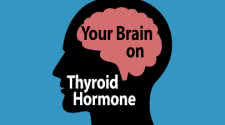Thyroid Hormone: Is Thyroid Useful for Weight Loss?

Advanced Health & Drug Science
Many people blame excess bodyfat on having a slow metabolism. Such decreased metabolic rates ate often ascribed to a sluggish thyroid gland. This idea has some basis in fact, since the hormones secreted by the thyroid gland (mainly trliodothyronine [TJ) do indeed determine the
resting metabolic rate of the body. Shouldn't thyroid drugs help this problem? Actually, the use of thyroid drugs to treat obesity fell into medical disfavor years ago. This is because most obese people showed normal thyroid activity - in fact, some even had increased thyroid
output Also making thyroid drugs undesirable is the fact that they can dangerously overstimulate the heart and catabolize muscle if taken in excessive doses.
Thyroid drugs, such as Cytomel, a preparation, are popular among many competitive bodybuilders. Because Cytomel is a relatively fast-acting drug, it's considered to have the potential for greater side effects. for this reason, most physicians prescribe another thyroid drug
called Synthroid to treat diagnosed hypothyroidism (low thyroid activity). Synthroid is a T4 version of thyroid hormone, meaning it contains an additional iodine molecule. Both T3 and 1, are synthesized from the amino acid tyrosine combined with iodine. The process involved
in converting these nutritional precursors into active thyroid hormones involves utilizing certain enzymes and free radicals, such as hydrogen peroxide.
Unlike Cytomel, Synthroid is far slower acting. The T, that constitutes Synthroid is now considered a storage form of thyroid, whereby the body can convert it into the more active 13 version as needed, thus considerably blunting the chance of excess thyroid activity that can
easily occur with the 13 version (Cytomel). More sophisticated scientific testing has shown that some people cannot readily convert T, into 13. Thus, people may appear normal in certain test results that determine T, blood levels, yet still be clinically hypothyroid.
A recent study, published in the American Journal of Cliakal Nutrition (63;879-83: 1996), found that people prone to obesity who lost weight through dieting showed decreased levels of active (T3) thyroid hormone. The resulting decreased resting metabolic rate predisposes such
people to regain the weight. This situation may be more common than previously believed. A study by researchers in the Czech Republic examined the use of thyroid drugs in 881 obese people who were unsuccessful in losing lot through diet and exercise, They found that using
thyroid hormone proved to be the only way the fattest subjects could effectively lose fat. The doctors conducting this study, however, cautioned that thyroid usage is contraindicated for elderly people and those with preexisting heart disease and/or high blood pressure. They
note that doses of thyroid must be carefully monitored and increased slowly. "No harmful effects are found with thyroid drugs in the hands of an experienced physician," conclude the authors of this study "They are safe, successful, and natural." The doctors also note that under
low calorie conditions, the conversion of 14 thyroid into the active 13 version is impaired.
In addition, if you consume less than 40 grams of carbohydrate a day, your body will convert active T3 into a metabolically inert version called reverse T This is a protective mechanism of the body to prevent self -cannibalism of muscle due to lack of carbohydrates or calories.
Should most dieters resort to thyroid usage? The best way to determine if thyroid drugs (which are available only through prescription) would aid dieting it through tests that measure free 13 levels. I these levels are low, then small amount of T, drugs - under a physician's
supervision - may make a huge difference in dieting results. Be aware, however, the excess thyroid hormone will burn both muscle and fat, in roughly that order.